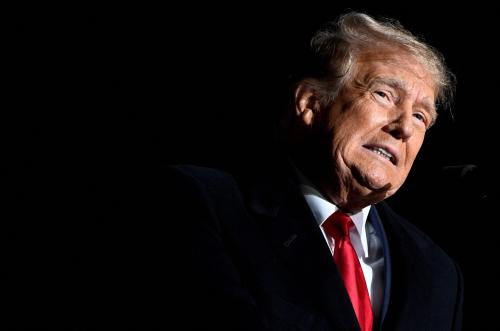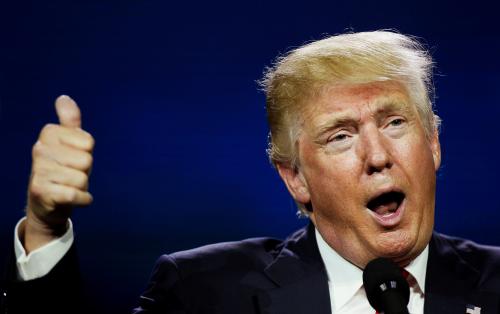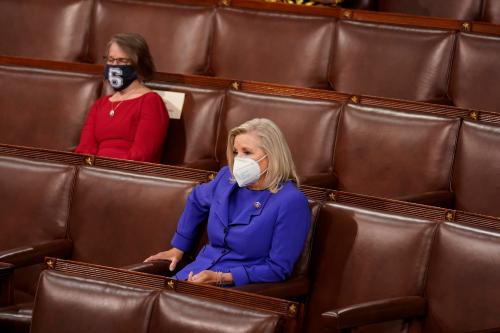As former President Donald Trump’s second impeachment trial begins, it shines a light on a new reality: although it’s been nearly 100 days since Trump lost his re-election he is not going away, at least in the short term. What will become of Trump? Here are nine possible outcomes for Trump’s future—the first four possibilities keep him in the middle of national politics; in the latter five, he would more likely fade away.
1. Leading the “Trumpublican” faction of the GOP
Over the course of four years as president, Trump masterfully consolidated Republican voters into a cult of personality. His hardcore supporters were willing to believe anything that left his lips, regardless of evidence to the contrary. They were willing to put their own lives at risk as he huddled them together at rallies and mocked those taking precautions to prevent the spread of COVID-19. They were willing to commit insurrection against their own government, all in his name and to support his lies about election malfeasance.
That non-trivial group of Republican and Republican-leaning voters is not going away, and they remain loyal not to the party but to Donald Trump. It remains to be seen exactly how large this group is, how much power they will wield in Republican primaries and whether a non-Trumpublican candidate can consolidate the remainder of the party.
January 6th showed us that there is essentially nothing his supporters are unwilling to do in his name. But the risk is that his behavior and his supporters’ behavior becomes so appalling that the remainder of the Republican Party says “enough is enough” and unites against him. The first test of this will be in the primaries during the 2022 midterms, where Trump is already threatening to “primary” Congresswoman Liz Cheney (R-WY) for her vote to impeach him. The ultimate test will be the 2024 presidential primaries. Trump as the 2024 nominee is a real possibility, and so is Trump as kingmaker.
2. Uniting MAGA to form a third party
After pushback from Republican governors and secretaries of state, judges, and even members of Congress like Liz Cheney and then-Senate Majority Leader Mitch McConnell (KY), Trump floated the idea of establishing a third party to promote his own views and give his supporters a home. Trump’s most ardent supporters not only offer allegiance to him but are deeply skeptical of any Republican who does not do the same. From an ideological perspective (steeped mostly in personal politics), there is a space for Trump go rogue and liberate himself and his supporters from the confines of the GOP.
However, such a move would prove disastrous for Republicans. Running third-party candidates would hemorrhage support from the GOP and improve Democrats’ chances not simply in swing districts and states, but in mainstream Republican states. That Democratic advantage would exist anywhere the third party fielded and funded a candidate. Someone may have broken through to Trump after his “Patriot Party” musings. Once a political action committee sprung up to begin raising money for Trump’s third-party idea, the Trump campaign committee distanced itself from it. There are plenty of foot-soldiers (quite literally), affiliated political staffers, and streams of grassroots funding to get such an effort off the ground. But Republican politicos know that while the Trump wing of the party is not large enough to be successful, it’s large enough to be devastating to their election chances.
3. Continuing calls for violent insurrection
Throughout the post-election period, President Trump denied his loss, generated a cottage industry of lies and misinformation about election fraud (that his attorneys could not discuss in court without committing perjury), and eventually motivated his supporters to react violently to the certification of the election. Those calls for violence translated to death threats for state officials including Secretary of State Brian Raffensberger (R-GA) and culminated in Trump’s supporters taking up arms against their own government on January 6th at the U.S. Capitol.
While the insurrection was put down, the ideas and motives of the seditionists in Trump’s coalition have not gone away. Trump could well become so desperate that he opts to continue to stoke violent flames of tension. Last month the Department of Homeland Security issued a terrorism advisory stating that “violent domestic extremists” pose a threat to the United States and are motivated by government restrictions in response to COVID-19 as well as false narratives about the election. Supporters of violent ideology see Trump as both their leader and their muse. Donald Trump embraces adoration, regardless of the source, and now that he has been stripped of the title “commander-in-chief,” he could find a different army, within the United States, to command and control.
4. Creating his own communications company
Whether you supported Trump or not, there is no denying that Twitter served as his most effective means of communicating with the world. When Twitter instituted a permanent ban on him it dramatically cut down on his ability to spread misinformation and instruct his supporters. This was a crushing blow to a president so dependent on the social media platform.
Trump also began to embrace more fringe television media such as OANN and Newsmax, even distancing himself from his beloved Fox News Channel. Trump could look at the media landscape, see a significant prospective audience and launch new ways to communicate with the world. This could include establishing his own news channel, likely first as an online platform and then eventually a more traditional television news network. This would give Trump, his family, his favored television personalities, and his ardent supports a platform for their views.
In conjunction with “Trump News Television,” the former president could establish a social media platform to allow his supporters to post what has gotten them banned from Facebook and Twitter: espouse hate, misinformation, death threats, Qanon conspiracies, and other lies. His app could face de-platforming challenges, similar to the now-defunct Parler, but it would also allow him to have a direct line to his army of supporters who are ready to embrace his rhetoric and believe his every utterance.
5. Maintaining marginal status in the GOP akin to Sarah Palin
In contrast to the scenarios mentioned above, Trump could lose the battle for the heart and soul of the GOP and become a marginalized figure in the Republican Party. In this scenario people will stop seeing him as the former president and instead view him as that obnoxious relative who retired to Florida and yells about the conspiracy theories he read online. His supporters will still remember him fondly, but will have moved on to a new, shiny, race-baiting candidate like Josh Hawley or Marjorie Taylor Greene.
Trump, like Palin or his former press secretary Sean Spicer, might try to raise his profile by appearing on network reality shows, but ultimately may return to his status as an entertainer and not a political player. The Republican Party could ignore Trump while embracing Trumpism. People like Ted Cruz and Lindsay Graham could unite his supporters with a similar message, while trying to turn the page on their old boss who couldn’t even manage to beat “Sleepy Joe.”
6. Get convicted by the Senate by a Republican Party ready to move on
Some of the paths forward for Trump are out of his hands. As he stares down his second impeachment trial in 13 months, conviction and being barred from office remains unlikely even though he is certain to face more conviction votes than last time. As information comes out about the president’s language and actions in the lead up to January 6th and the activities in the Capitol that day, the long-shot scenario is one in which Trump’s efforts for acquittal fail. It would take unanimous support from Democratic senators (an all but certain outcome) and the votes of at least 17 Republican senators (the true long shot).
In a secret vote on whether or not Congresswoman Liz Cheney (R-WY) could retain her position in the House Republican Leadership in spite of her vote to impeach Trump, she won a significant 145 to 61 victory. House Republicans refused to sanction Congresswoman Marjorie Taylor Greene (R-GA) for advocating Nancy Pelosi’s assassination and propagating far-right conspiracy theories, but on a floor vote to remove her committee assignments 11 Republicans joined Democrats. Like the House, the Senate is also at a crossroads. The vote to convict Trump could be divisive within the party, but it would signal publicly what a clear and significant number of Republicans will say privately: the only path forward for the GOP is a world without Trump. Whether 17 Republican senators demonstrate profiles in courage or resort to profiles in cowardice will powerfully determine what Trump’s post-presidency looks like.
7. Disappearing in a swamp of criminal charges and civil suits
Another option out of Trump’s hands depends on what happens in the U.S. Department of Justice, the Attorney General’s office in New York, the Manhattan District Attorney’s office, and other law enforcement entities around the country currently investigating Donald Trump, his kids, his friends, and the Trump Organization. There is a significant chance that Trump, his affiliates, and his company face legal troubles that will consume their time, their money, and possibly their liberty.
If Trump, et. al. face charges and lawsuits from all directions, his ability to organize politically and financially to play kingmaker in Republican politics will be significantly curtailed. It could also present a significant enough stain on the Trump brand to force much of the party to distance themselves from him. This will particularly be true if Trump tries to raise funds from Republican Party sources to wage legal defenses—funding that would cut into the party’s efforts to take back control of Congress in 2022 and the White House in 2024. Although Republicans see Trump’s enthusiasm and his supporters’ commitment to him as part of the lifeblood of GOP success, if Trump begins to interrupt the money flow for the party, that could be a final straw.
8. Going to jail
As Trump’s legal headaches pile up, jail time is a real possibility. Allegations of tax evasion/fraud, money laundering, improper engagement with foreign entities, and others to come put the former president in a type of legal jeopardy he has never faced before. Trump’s legal problems could place him before state and federal judges who are unwilling to let his celebrity and claims of wealth supersede sentencing guidelines. It’s unlikely but possible that the former president could find himself in a place none of his predecessors found themselves: an orange jumpsuit.
An incarcerated Trump would make it difficult for him to campaign for president again. It would also make it impossible to barnstorm for his preferred candidates. His ability to fundraise would be nixed and his power to communicate with his supports would be severely limited. And while his endorsement from behind bars may bizarrely translate into political cache in some of the most pro-sedition, MAGA country congressional districts, throughout most of America it would be a liability. In this scenario, Trump will claim that he is a political prisoner, but the reality would be that Republican politics would no longer be a prisoner to him.
9. Looking abroad, either for refuge or to enrich himself
If Donald Trump sees a real possibility of an indictment in the United States, he could do what a lot of wealthy people staring down an arrest do: flee the country. While he wouldn’t be universally embraced (I’m sure Emanuel Macron or Angela Merkel would happily extradite him back or refuse him entry), there are havens for the former president abroad. First, there will be several countries who will happily take him in. Russia is at the top of the list. Saudi Arabia or Israel may also offer him a safe space. Second, he has a private plane which would also make his escape from the country easier than it would be for the rest of us. However, in his attempt to flee Trump would face a challenge that only nine other people face: lifetime Secret Service protection. He is protected by a law enforcement agency that would likely be charged to take him into custody if he were feeling an active indictment. In some sense, Trump will be surrounded by 6-foot-tall ankle bracelets, ready to stop his jet-setting to freedom.
In the absence of any threat to his freedom in the U.S., and with a brand that has declined in value at home, Trump may find countries where his name still carries weight. Trump Tower Moscow may get resuscitated. Trump Hotel Riyadh, Trump Resort Manila, or Trump National Golf Course outside Tel Aviv may be his future. As leaders and the public in some countries see Trump as a successful, powerful, wealthy former U.S. president, and as QAnon becomes increasingly global in reach, his best path back to wealth may be abroad.
Former presidents all seem to do the same thing. They get a big contract to write their memoirs and they turn their attention to the fundraising and design of their presidential libraries. They travel abroad and at home making some big-dollar speeches. But just as Trump’s presidency didn’t look like anything we’d ever seen before, neither will his post presidency—regardless of the path it takes.
The Brookings Institution is committed to quality, independence, and impact.
We are supported by a diverse array of funders. In line with our values and policies, each Brookings publication represents the sole views of its author(s).










Commentary
Trump’s future: Nine possibilities
February 5, 2021